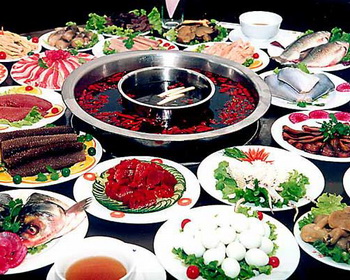
 China Tours
China Tours Tibet Tours
Tibet Tours China Theme Tours
China Theme Tours Off The Beaten Track
Off The Beaten Track Yangtze Cruises
Yangtze Cruises China Trip Planner
China Trip Planner Travel Agents
Travel Agents


We had a wonderful time in Tibet. We have learned a lot about this unique destination because of the wonderful guide Degyi who is so knowledge and always available towards our tours. We stayed at the Shangri-La Hotel Lhasa, and we would never imagine a Tibet travel could be so nice and amazing without the help of Degyi.
Also, thanks a lot to our Tibetan driver Mr.Wongdun for his safe driving and a good sense of service along the way.
We shall return Tibet in the near future!
P.B. and A. A - Europe
Tibet Travel
June 2018 (Private Tibet Journey from Kathmandu)

Posted: May 2, 2013 By: Admin
Chengdu, the capital of Sichuan Province, is a city obsessed with eating. According to Wang Xudong, editor of Sichuan Cuisine magazine, it has the highest density of restaurants and teahouses of any city in the world - some 40,000 at the latest estimate. Food crazes tear across the culinary landscape like prairie fires; local radio hosts recite news of the latest restaurant openings in drooling tones. In 2010 Unesco designated Chengdu the first City of Gastronomy in Asia, ahead of Tokyo, Hong Kong and Singapore.
To win this accolade, local officials and food historians had to demonstrate the city's distinctive culinary culture, including special ingredients, dishes and cooking methods; its vibrant restaurant scene and traditional food industry; and its commitment to environmental sustainability and gastronomic education. "Apart from the panda," says Professor Du Li of the Sichuan Institute of Higher Cuisine, "nothing is more important to the Sichuanese than food. People here love to search out small restaurants in out-of-the-way places that may just specialise in a couple of dishes."
The Sichuanese is undoubtedly one of China's great cuisines, thrilling in its flavours, diverse in its ingredients and encompassing everything from refined banquet dishes to the most scrumptious street snacks. Though often known by outsiders simply as "hot and spicy", it is better characterised by its startling range of flavours, from the infamous "numbing and hot" combination of chillies and Sichuan pepper through to understated dishes in which the essential tastes of prime ingredients shine through.
The past decade has seen the disappearance of most of the city's old lanes, with their street vendors, markets and artisanal food producers; a kitchen invasion by Cantonese bottled sauces and chicken-stock powder, and the arrival of a plethora of new influences, including Japanese-style sashimi and western fast food. So where, in this city of dizzying gastronomic choice, should a visitor eat?
It would be a shame not to sample the street food that gave the world such delights as dan dan noodles and man-and-wife offal slices (a potent appetiser of tripe and other titbits tossed with chilli oil, Sichuan pepper and crushed nuts and seeds). Real street traders are increasingly hard to find, but look out for those offering custardy "flower" bean curd (dou hua) scattered with fragrant oils and crunchy pickles. The vendors can be recognised by their red-and-black wooden barrels. Many old-fashioned snacks have migrated indoors into little restaurants, such as Granny Wang's, which serves buckwheat noodles made on the spot with a huge press. Ideally one would buy each snack from a specialist vendor, but for an overview it's worth visiting the opulent Shunxing Teahouse in Hong Kong-style Century City, where you can order a set menu of a dozen or more "small eats" while watching a show of face-changing and other local performing arts.
One of Sichuan's most notorious delicacies is the "ox-tripe hotpot", originally a speciality of the great Yangtze metropolis of Chongqing but now popular across the region. It's an eating ritual best enjoyed at night, when you have hours to fritter away over a seething cauldron of chillies and Sichuan pepper, cooking your own choice of ingredients in the fiery broth and dipping them in sesame oil and crushed garlic to eat. The squeamish should be warned that the most prized hotpot ingredients include not only tripe but other rubbery and slithery ingredients, such as goose intestines and cartilage; there are also fresh mushrooms and vegetables, however, as well as sliced meats and seafood, and a divided hotpot containing a mild stock alongside the traditional brew can be provided for those who'd prefer a choice of hot or not.
Feverish competition in the catering industry means restaurants are under constant pressure to innovate. Fashions come and go, and businesses often try to sell themselves with a particular gimmick or an unusual regional slant, such as the Wuling Mountain Delicacies chain, which specialises in the mushroom cookery of the Tujia ethnic group (dinner here might include a mushroom hotpot and smoky bacon stir-fried with preserved chillies).
"A Chinese restaurant in the west might be able to get away with serving gong bao chicken for its whole life, but here they have to change their menus all the time," says Wang Xudong.
Older Sichuan food aficionados often hanker after the flavours of their childhoods and the old mom-and-pop restaurants that have been swept away by the redevelopment of the city. One restaurateur who satisfies the craving for nostalgic flavours is Liu Shaokun, whose establishment in the suburb of Shuangliu is well worth the tedious drive from the city centre. Liu makes his own pickles and cures his own winter meats. House specialities include stewed turtle with potatoes, cold spicy noodles with shredded chicken and peasant soups made with seasonal vegetables.
For banquet cookery Yu's Cuisine, run by maverick chef Yu Bo and his wife Dai Shuang, remains extraordinary. The restaurant has only six private rooms and no a la carte menu. A typical feast for a group here consists of dozens of dishes, including dazzling vegetarian starters, slow-cooked meats, little buns in the shape of hedgehogs and the odd modernist surprise, such as spherified jasmine tea inspired by a visit to El Bulli. Another original talent is chef Zhang Yuanfu of the Wu Yuan, who offers grand banquets in surroundings inspired by the Qing dynasty. Like Yu Bo's, his food has an intimacy that is missing amid the rampant commercialisation of the mainstream catering scene.
Aside from the food, one of the great pleasures of Chengdu life is the teahouse. A couple of decades ago, there was a teahouse on every back street where people gathered to play cards or mah jong, parade their pet birds or listen to Sichuan opera. Small teahouses can still be found tucked away beside the waterways in quiet corners of the city; easier to find are the larger but equally charming teahouses in the parks. One favourite is the sprawling riverside teahouse in Wangjiang Park, where you can have your ears cleaned with goose feathers as you nibble watermelon seeds and sip your jasmine-blossom tea.
If by any chance you overeat and feel a little delicate, a medicinal meal might be in order. The Qin Shan Zhai, close to the Temple of Marquis Wu and the city's Tibetan quarter, specialises in tonic soups. Every dish on the menu is accompanied by a description of its curative properties: tea-smoked goose, for example "eliminates wind-damp and strengthens the bones", while chicken soup "enriches the blood and body". Order according to your ailments, or if you prefer, make up a few as an excuse for eating the dishes you fancy.
Source: Guardian
China Trip Planner | Travel Agents | About Us | Why Us | Contact Us | How to Pay | How to Book - Terms & Conditions | Site Map
Copyright © 2010 - 2030 All Rights Reserved.


 0086-28-85711328
0086-28-85711328 0086-28-85546015
0086-28-85546015



